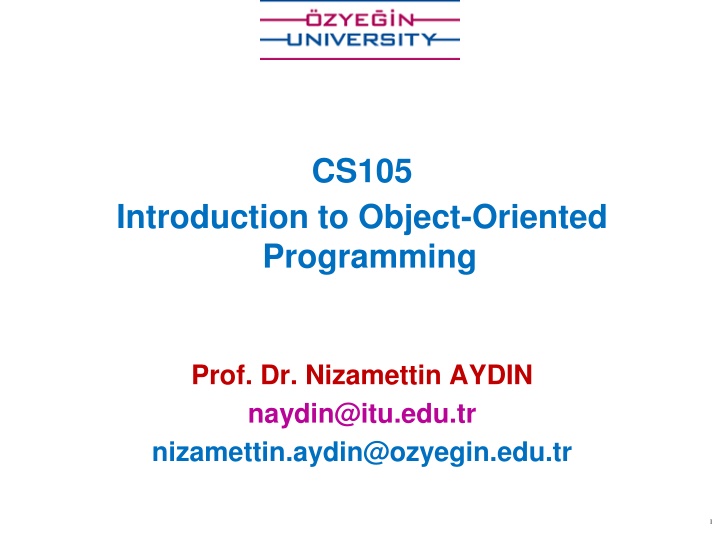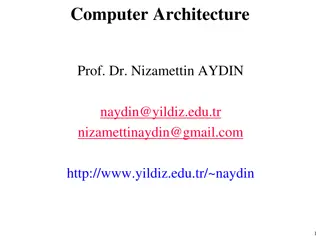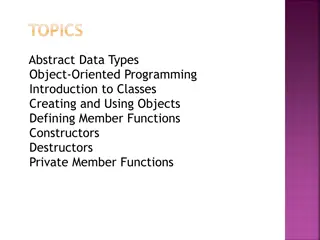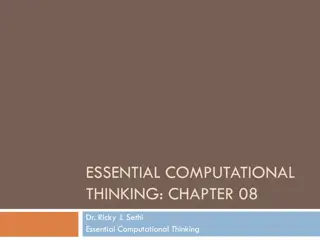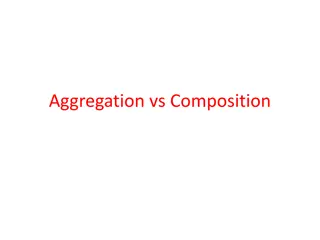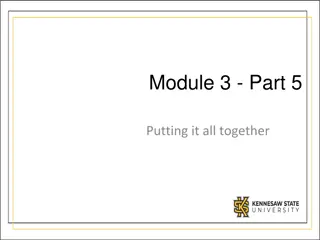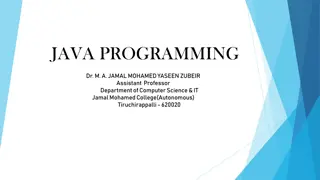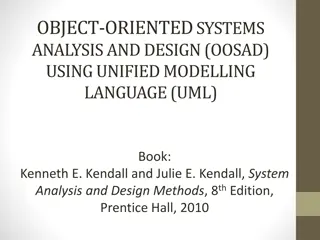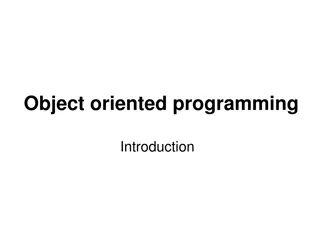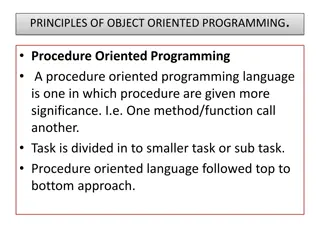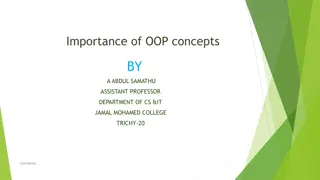Introduction to Object-Oriented Programming with Prof. Dr. Nizamettin AYDIN
This content covers a basic introduction to object-oriented programming using a class example of a bank account. It includes details on defining class attributes, creating objects, depositing money, and printing account details. The provided code snippets and visual aids help in understanding key concepts such as member variables and class functionality.
Download Presentation

Please find below an Image/Link to download the presentation.
The content on the website is provided AS IS for your information and personal use only. It may not be sold, licensed, or shared on other websites without obtaining consent from the author.If you encounter any issues during the download, it is possible that the publisher has removed the file from their server.
You are allowed to download the files provided on this website for personal or commercial use, subject to the condition that they are used lawfully. All files are the property of their respective owners.
The content on the website is provided AS IS for your information and personal use only. It may not be sold, licensed, or shared on other websites without obtaining consent from the author.
E N D
Presentation Transcript
CS105 Introduction to Object-Oriented Programming Prof. Dr. Nizamettin AYDIN naydin@itu.edu.tr nizamettin.aydin@ozyegin.edu.tr 1
Classes 2
Outline Class example - Bank Account Depositing Money Account Class Bank Account version 1 Printing Class Variables Object Functionality Bank Account version 2 Bank Account version 3 3
Class example - Bank Account public class AccountTest { public static void main(String[] args) { int account1ID = 1; double account1Balance = 1000; String account1Currency = "TL"; int account2ID = 2; double account2Balance = 800; String account2Currency = "USD"; System.out.println("Account " + account1ID + " has " + account1Balance + " " + account1Currency + "."); System.out.println("Account " + account2ID + " has " + account2Balance + " " + account2Currency + "."); } } 4
Depositing Money // Deposit 50 TL into account 1 account1Balance = account1Balance + 50; // Deposit 300 USD into account 2 account2Balance = account2Balance + 300; account1Balance account2Balance Before: 1000 800 account1Balance account2Balance After: 1050 1100 5
Printing Account Details System.out.println("Account " + account1ID + " has " + account1Balance + " " + account1Currency + "."); System.out.println("Account " + account2ID + " has " + account2Balance + " " + account2Currency + "."); // Deposit 50 TL into account 1 account1Balance = account1Balance + 50; // Deposit 300 USD into account 2 account2Balance = account2Balance + 300; System.out.println("Account " + account1ID + " has " + account1Balance + " " + account1Currency + "."); System.out.println("Account " + account2ID + " has " + account2Balance + " " + account2Currency + "."); 6
Account Class Each account has an ID, balance and currency. These can be thought as attributes of an account. Can we have an account object which holds all these necessary data together? public class Account { int number; double balance; String currency; } These are called member variables of the class or fields. They are also referred to as instance variables. 7
Bank Account version 1 public class Account { int number; double balance; String currency; } Account.java This is the class which provides the specifics of the Account object AccountTest.java Account account1 = new Account(); account1.number = 1; account1.balance = 100; account1.currency = "TL"; In here, we have two Account objects: account1 and account2 Account account2 = new Account(); account2.number = 2; account2.balance = 200; account2.currency = "USD"; 8
Printing Class Variables System.out.println("Account " + account1.number + " has " + account1.balance + " " + account1.currency + "."); System.out.println("Account " + account2.number + " has " + account2.balance + " " + account2.currency + "."); 9
What will be the output? System.out.println("Account " + account1.number + " has " + account1.balance + " " + account1.currency + "."); System.out.println("Account " + account2.number + " has " + account2.balance + " " + account2.currency + "."); // Deposit 50 TL into account 1 account1.balance = account1.balance + 50; // Deposit 300 USD into account 2 account2.balance = account2.balance + 300; System.out.println("Account " + account1.number + " has " + account1.balance + " " + account1.currency + "."); System.out.println("Account " + account2.number + " has " + account2.balance + " " + account2.currency + "."); 10
Object Functionality Depositing money to an account is actually a functionality of an account. All accounts can be deposited some amounts of money How can we make depositing money a functionality of account object? By defining it as a member function 11
Bank Account version 2 public class Account { int number; double balance; String currency; public void deposit(double d) { balance = balance + d; } } 12
deposit member function Before deposit member function // Deposit 50 TL into account 1 account1.balance = account1.balance + 50; // Deposit 300 USD into account 2 account2.balance = account2.balance + 300; After deposit member function // Deposit 50 TL into account 1 account1.deposit(50); // Deposit 300 USD into account 2 account2.deposit(300); 13
Class We have written our first class! public class Account { int number; double balance; String currency; member variables or instance variables public void deposit(double d) { balance = balance + d; } Member Functions } 14
From last lecture Our proposed programs need to match to the problem we are trying to solve In the problem, what are the real-world objects? what kind of data do they hold? (attributes) what kind of functionalities they have? (behavior) Solve the problem in terms of these objects Objects in the real world ~ Objects in our programs Low representational gap The object oriented programming 15
Class We have written our first class! public class Account { int number; double balance; String currency; member variables or instance variables attributes public void deposit(double d) { balance = balance + d; } member functions behaviors } 16
Objects We have also used this class to create objects! public class AccountTest { public static void main(String[] args) { Account account1 = new Account(); account1.number = 1; account1.balance = 100; account1.currency = "TL"; Account account2 = new Account(); account2.number = 2; account2.balance = 200; account2.currency = "USD"; System.out.println("Account " + account1.number + " has " + account1.balance + " " + account1.currency + "."); System.out.println("Account " + account2.number + " has " + account2.balance + " " + account2.currency + "."); } } 17
Objects public class AccountTest { public static void main(String[] args) { Account account1 = new Account(); account1.number = 1; account1.balance = 100; account1.currency = "TL"; Account account2 = new Account(); account2.number = 2; account2.balance = 200; account2.currency = "USD"; System.out.println("Account " + account1.number + " has " + account1.balance + " " + account1.currency + "."); System.out.println("Account " + account2.number + " has " + account2.balance + " " + account2.currency + "."); // Deposit 50 TL into account 1 account1.deposit(50); // Deposit 300 USD into account 2 account2.deposit(300); System.out.println("Account " + account1.number + " has " + account1.balance + " " + account1.currency + "."); System.out.println("Account " + account2.number + " has " + account2.balance + " " + account2.currency + "."); } } 18
Report Account Information System.out.println("Account " + account1.number + " has " + account1.balance + " " + account1.currency + "."); System.out.println("Account " + account2.number + " has " + account2.balance + " " + account2.currency + "."); // Deposit 50 TL into account 1 account1.deposit(50); // Deposit 300 USD into account 2 account2.deposit(300); System.out.println("Account " + account1.number + " has " + account1.balance + " " + account1.currency + "."); System.out.println("Account " + account2.number + " has " + account2.balance + " " + account2.currency + "."); How can we fix this? Reporting its information can be a functionality of accounts. report member function! 19
Bank Account version 3 report member function! public class Account { int number; double balance; String currency; public void deposit(double d) { balance = balance + d; } public void report() { System.out.println("Account " + number + " has " + balance + " " + currency + "."); } } 20
Bank Account version 3 report member function! System.out.println("Account " + account1.number + " has " + account1.balance + " " + account1.currency + "."); System.out.println("Account " + account2.number + " has " + account2.balance + " " + account2.currency + "."); public void report() { System.out.println("Account " + number + " has " + balance + " " + currency + "."); } } 21
Bank Account version 3 public class AccountTest { public static void main(String[] args) { Account account1 = new Account(); account1.number = 1; account1.balance = 100; account1.currency = "TL"; Account account2 = new Account(); account2.number = 2; account2.balance = 200; account2.currency = "USD"; account1.report(); account2.report(); // Deposit 50 TL into account 1 account1.deposit(50); // Deposit 300 USD into account 2 account2.deposit(300); account1.report(); account2.report(); } } 22
